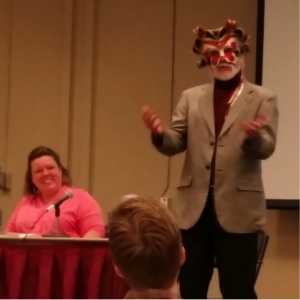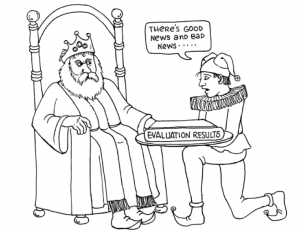My name is Charmagne Campbell-Patton and I am an independent evaluator. This was my first year at MESI, and I really appreciated the focus on social justice. One of the main themes that ran across most of the presentations was the power that comes with the role of evaluator and our responsibility to use that power to promote social justice. Here are just a few of the salient points I took away with me:
Hot Tip: Speak truth to power. In his workshop with Nora Murphy on wicked problems in Developmental Evaluation, Michael Patton likened the evaluator to the Medieval Jester, whose role was to deliver bad news to the Monarch in a way that could be heard. To drive home the point, Michael donned a jester mask, which he wears when beginning a new evaluation assignment to lighten the mood. In addition to providing some levity to tense situations, the mask is a good reminder that evaluators have a responsibility to tell the truth, especially when no one else can or will and in particular, to those who may not want to hear it.
Cool Trick: Empower others to speak for themselves
Michael’s presentation certainly made an impression, but he is a white man with a PhD and 45 years of experience as an evaluator, all of which make it much easier for him to speak truth to power than for some. So how do you get people to listen if you’re not in a position of power? One option is to empower those who are traditionally marginalized to speak for themselves by providing them with data that gives them a voice. In his keynote, Eric Moore, Director of Research and Evaluation at Minneapolis Public Schools, emphasized the importance of paying attention to the theoretical frameworks that inform evaluation work because the design of an evaluation determines who has a voice and who is at the table to make meaning of the data.
Hot Tip: Hold yourself accountable. When asked what he did when those in power didn’t listen to him or those he was trying to give voice, MQP shared that sometimes he had to walk away. Indeed, in his closing words, Eric Moore offered this piece of advice: Be accountable on a daily basis to yourself and why you are doing the work.
Lesson Learned: Evaluation in a social justice context takes courage. Perhaps that should be added to Jean King and Laurie Stevehan’s essential competencies for evaluators?
Rad Resources: Classic analyses:
Hill, A. (1997) Speaking truth to power. New York: Doubleday.
Hoppe, R. (1999). Policy analysis, science and politics: from ‘speaking truth to power’ to ‘making sense together.’ Science and Public Policy, 26 (3): 201-210.
Spiegel, A., Watson, V., & Wilkinson, P. (1999). Speaking truth to power?. The Anthropology of Power.
Wildavsky, A.B. (1979). Speaking truth to power: The art and craft of policy analysis. New Brunswick, NJ: Transaction Books.
The American Evaluation Association is celebrating MESI Spring Training Week. The contributions all this week to aea365 come from evaluators who presented at or attended the Minnesota Evaluation Studies Institute Spring Training. Do you have questions, concerns, kudos, or content to extend this aea365 contribution? Please add them in the comments section for this post on the aea365 webpage so that we may enrich our community of practice. Would you like to submit an aea365 Tip? Please send a note of interest to aea365@eval.org. aea365 is sponsored by the American Evaluation Association and provides a Tip-a-Day by and for evaluators.


